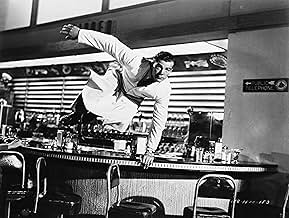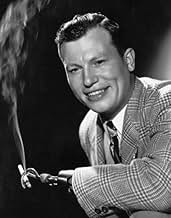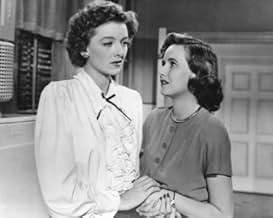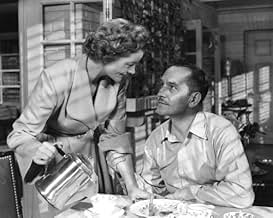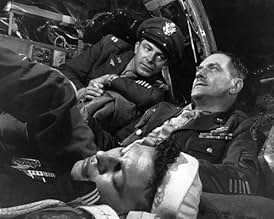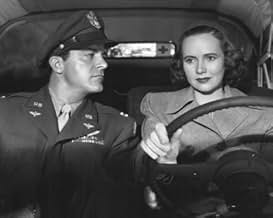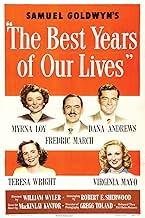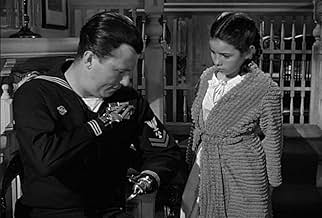Tres hombres que regresan de la guerra a su ciudad realizan juntos la etapa final del viaje y entablan amistad. Cada uno se encuentra, a su manera, con dificultades para adaptarse de nuevo a... Leer todoTres hombres que regresan de la guerra a su ciudad realizan juntos la etapa final del viaje y entablan amistad. Cada uno se encuentra, a su manera, con dificultades para adaptarse de nuevo a una vida normal.Tres hombres que regresan de la guerra a su ciudad realizan juntos la etapa final del viaje y entablan amistad. Cada uno se encuentra, a su manera, con dificultades para adaptarse de nuevo a una vida normal.
- Dirección
- Guionistas
- Elenco
- Ganó 7 premios Óscar
- 25 premios ganados y 4 nominaciones en total
- Al Stephenson
- (as Frederic March)
- Dirección
- Guionistas
- Todo el elenco y el equipo
- Producción, taquilla y más en IMDbPro
Resumen
Opiniones destacadas
Definitely a family orientated movie (Cert U) this will appeal to and find favour with all ages, but don't start thinking that this is all gooey, slushy nonsense. There's some quite hard-hitting topics covered, even by today's standards and of course, with our minds on our current troops in Iraq/Afghanistan, equally relevant.
Multi-stranded, which each of the three G.I.'s immediate and extended families and friends being examined, it's about them coping, with varying degrees of success, with home life and getting jobs, now that the War is ended. It's the little observations and stories around them that are so fascinating, as the Heroes of yesterday are now anything but when it comes finding new purpose in a changed world.
The cast is exemplary, not necessarily the biggest stars of the day but the most believable and natural for their roles. Dana Andrews, Myrna Loy and Fredric Marsh are the ones most easily recognisable and their appearances convey a sort of reassuring familiarity and normality. They're all excellent, of course.
Though long, at nearly 3 hours, William Wyler's easy going but assured and tight direction keeps things flowing nicely and it never drags. This, my second viewing, is an enjoyable one as the first and if anything I'm more at ease with it.
Though obviously not as exciting or dramatic as other 'normal' war films, it's a tragedy that it's not more well known. I've never seen it to ever have been on TV, or to my recollection, even Sky Movies, for that matter. Any movie that won 7 Oscars and is currently no. 180 in the top 250 IMDb's films of all time, voted by its voters (us, the public) is hardly one of minority interest.
A friend I lent my DVD to watched it with his family and normally they only go for current films, or ones they know, but they not only enjoyed it, but felt enormously moved by it, too.
If you haven't seen The Best Years... yet, make a mental note to do so. Your life won't change by doing so, but it really is worth the 3 hours of it that it will take. You certainly can't say the same about every film out there....
The whole point of this film when it was released still makes perfect sense today, though I'm sure it doesn't have the same impact it did in those first years after World War II ended. Returning servicemen, with all kinds of backgrounds before and during the war, hit a wall coming home: wives who no longer loved them, jobs that had dried up, a culture that was foreign to them and that found them, these men, to be foreign themselves.
It wasn't a crisis to take lightly. These were the guys who were drafted to fight the enemy, and in going overseas they lost some of the best years of their lives, if not their lives. The country knew its debt in the abstract, but it also knew it in sons and husbands who really did come home and who had to face it all. This movie was both a reckoning for the sake of national healing and a brilliant drama that would be beautifully pertinent and therefore successful. And what a success, then and now.
The consummate Hollywood director William Wyler shows in this fast, long movie just what a master he is at working the medium. With Gregg Toland at the camera, Wyler makes a highly fluid movie, visual and dramatic and weirdly highly efficient. With the three main plots interweaving and depending on each other, the drama (and melodrama) build but never beyond plausibility. Wyler knew his audience wouldn't put up with pandering or cheap mistakes. Casting Harold Russell as Homer, knowing the audience would hear about how Russell really was a soldier who lost both hands in the war, was a huge step toward creating both empathy and credibility. It even practices a key theme in the move--to go beyond your bounds to make a difference, to give these guys a break and help them assimilate.
It's interesting how singular this movie is, trying to show the truth in these kinds of situations. The other post-war films about army and navy men fall into two large and dominating categories--war films and film noir. And it is film noir that comes closest to getting at the problem of the G.I. not reintegrating well, making it a whole style, brooding and spilling over with violence. "The Best Years of Our Lives" has a highly controlled and even contrived plot structure, but it aims to be honest and representative.
That it's remarkable formally--the way it is shot and edited and acted, top to bottom--is not surprise, given the heights that Hollywood had reached by then, and given that Wyler is easily the slickest of them all, in the best sense. That the movie makes such beautiful sense and really works as a story, a moving and heartwarming story without undue sappiness, is a whole other kind of achievement. A terrific, rich, full-blooded, uncompromised movie.
***** To me watching this movie is like opening up a time capsule. I think in many ways "The Best Years of Our Lives" is probably one of the more fascinating character studies and it holds up extremely well as a look at life in the US in the mid-1940s after WWII. I believe "Coming Home" and "The Deer Hunter", both released in 1978, were the most recent films that were closest in capturing the numerous issues of military men returning from war that were brought up in "The Best Years of Our Lives".
What really impressed me was watching the movie in its entirety when I was in college around 1980-81 and many if not all of the college students applauded at the end of the movie.
This movie still packs a wallop and I'm very happy to read in other posts other users feeling of a movie that will definitely stand the test of time. *****
I'm very happy to see the movie ranked near the top 100 movies on IMDb and AFI. Also, though it was in competition with what eventually became a Christmas classic, It's a Wonderful Life, arguably, The Best Years of Our Lives' Oscar wins, including Best Picture, were very well-deserved.
I've just seen the film again in 2005 and after almost 60 years, The Best Years of Our Lives is still a powerful, beautifully acted and well-crafted motion picture.
Back in 1946, it was a jaw-dropper to have a character in a movie utter the word "divorce" or to aver an intent to break up a marriage -- such ideas just weren't voiced in films then. To modern audiences, they come across as melodramatic, but I'm told they elcited genuine gasps from audiences then.
Even more astonishing was William Wyler's decision to cast real-life amputee Harold Russell in the key role of a returning Navy veteran. Until <i>The Battle of Britain</i>, in which an actual, disfigured RAF veteran made a cameo appearance, directors didn't make those sorts of courageous gestures. The intimate yet innocent scene in which Homer Parrish (Russell) demonstrates his helplessness to his fiancé Wilma Cameron (Cathy O'Donnell) is beautiful, heartbreaking and uplifting; later, during the wedding scene, Russell stumbled over a line in saying the vows, and Wyler left the humanizing mistake in, God bless him for it.
Oscars Best Picture Winners, Ranked
Oscars Best Picture Winners, Ranked
¿Sabías que…?
- TriviaFor his performance as Homer Parrish, Harold Russell became the only actor to win two Academy Awards for the same role. The Academy Board of Governors thought he was a long shot to win, so they gave him an honorary award "for bringing hope and courage to his fellow veterans through his appearance." Later in the ceremony, he won for Best Supporting Actor.
- ErroresWhen Al introduces his wife and daughter to Fred and Homer at Butch's, he refers to Dana Andrews as Homer and Harold Russell as Fred. This was intended as a consequence of Al being drunk.
- Citas
[after Peggy tells her parents that they never had any trouble in their relationship]
Milly Stephenson: "We never had any trouble." How many times have I told you I hated you and believed it in my heart? How many times have you said you were sick and tired of me; that we were all washed up? How many times have we had to fall in love all over again?
- Créditos curiososThe character played by Ray Teal (the Axis sympathizer whom Homer Parrish attacks at the soda fountain) is listed in the credits as "Mr. Mollett". However, the character's name is never mentioned or otherwise alluded to.
- Versiones alternativasThe film was modified to play on a wide screen and reissued on February 3, 1954.
- ConexionesEdited into Titán del espacio (1950)
- Bandas sonorasAmong My Souvenirs
(1927) (uncredited)
Music by Edgar Leslie
Lyrics by Lawrence Wright
Played on piano by Hoagy Carmichael
Selecciones populares
Detalles
- Fecha de lanzamiento
- País de origen
- Idioma
- También se conoce como
- The Best Years of Our Lives
- Locaciones de filmación
- Productora
- Ver más créditos de la compañía en IMDbPro
Taquilla
- Presupuesto
- USD 2,100,000 (estimado)
- Total en EE. UU. y Canadá
- USD 23,650,000
- Total a nivel mundial
- USD 23,667,133
- Tiempo de ejecución2 horas 50 minutos
- Color
- Relación de aspecto
- 1.37 : 1
Contribuir a esta página



